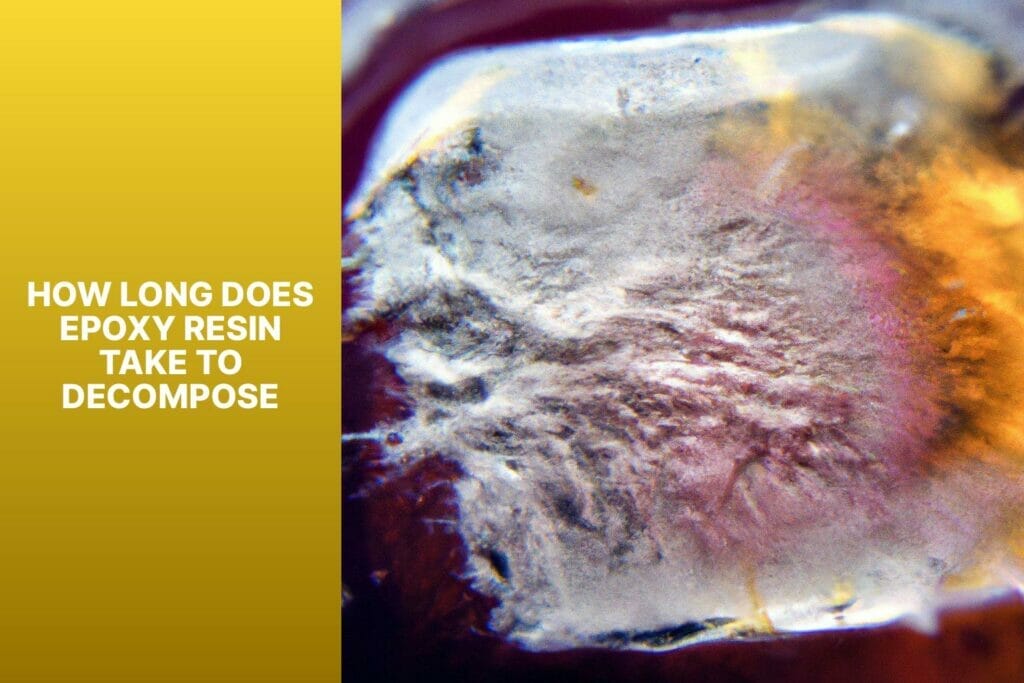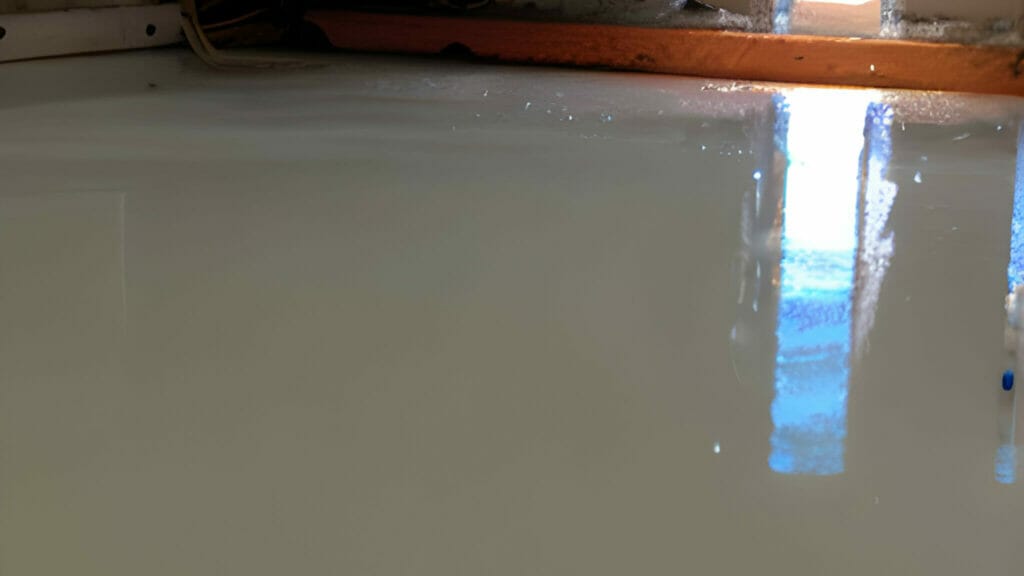When it comes to the environmental impact of epoxy resin, understanding its decomposition process is essential. Epoxy resin is a versatile and durable material commonly used in various industries but not biodegradable.
To grasp the implications of epoxy resin decomposition, it is crucial to explore how it breaks down and the factors that influence this process.
The decomposition of epoxy resin involves degrading its chemical structure over time. Various factors, such as exposure to heat, moisture, light, and chemical agents, can influence the decomposition process.
These factors determine the rate at which epoxy resin breaks down and whether it can fully decompose.
One important question is how long it takes for epoxy resin to decompose. The decomposition time of epoxy resin can vary depending on the specific formulation, environmental conditions, and the presence of any catalysts or accelerators used during its application.
In some cases, epoxy resin can take several decades or even longer to decompose, while in other situations, the decomposition process may occur faster.
It’s important to note that epoxy resin does not fully decompose in most cases. Instead, it may fragment into smaller pieces, releasing chemicals and microplastics into the environment.
The decomposition time of epoxy resin is influenced by temperature, humidity, and exposure to UV radiation. These factors can accelerate or decelerate the degradation process.
Understanding the environmental impact of epoxy resin decomposition is critical. When epoxy resin decomposes, it can release toxic chemicals into the environment and contribute to pollution. The accumulation of epoxy resin waste can harm ecosystems and aquatic life.
Proper disposal methods for epoxy resin waste are essential to minimize its environmental impact. Safe and eco-friendly disposal options include recycling epoxy resin waste through specialized programs or facilities or contacting local hazardous waste disposal centers.
By understanding epoxy resin’s decomposition process and environmental consequences, individuals and industries can make informed decisions about its use, disposal, and potential alternatives to minimize its environmental impact.
Key takeaway:
- Epoxy resin takes a considerable amount of time to decompose: The decomposition process of epoxy resin is slow, meaning it can persist in the environment for a long time before breaking down.
- The decomposition of epoxy resin is influenced by several factors: Factors such as temperature, sunlight exposure, and moisture can affect the rate of epoxy resin decomposition.
- Proper disposal methods are necessary for epoxy resin waste: To minimize the negative impact of epoxy resin, it is important to dispose of it safely and in an eco-friendly manner, following recommended guidelines.
What is the Decomposition of Epoxy Resin?
Epoxy resin decomposes when exposed to certain conditions. The chemical structure of the resin breaks down during this process, releasing various byproducts. This decomposition is a result of thermal degradation.
Factors like temperature, humidity, and UV light influence the decomposition of epoxy resin. Higher temperatures speed up the process, while lower temperatures slow it down.
Humidity also affects the decomposition rate, with higher moisture levels potentially increasing degradation.
The specific formulation and conditions determine the byproducts of epoxy resin decomposition. Common byproducts include volatile organic compounds (VOCs), carbon dioxide, water, and various gases.
These byproducts can impact human health and the environment. VOCs contribute to air pollution, while carbon dioxide contributes to climate change.
It’s important to remember that epoxy resin decomposition is a gradual process that can vary in duration.
The decomposition rate is influenced by factors such as resin thickness, exposure to external elements, and the presence of catalysts or accelerators.
Regular monitoring and proper handling of epoxy resin can help mitigate potential risks associated with decomposition.
How Does Epoxy Resin Decompose?
Epoxy resin decomposes through a process known as thermosetting. This occurs when the resin and hardener react, forming strong chemical bonds solidifying the material.
Nevertheless, it is important to note that heat and UV radiation can break these bonds, thus leading to the decomposition of epoxy resin.
Multiple factors come into play regarding the decomposition of epoxy resin. Temperature is crucial, as higher temperatures accelerate the decomposition process, while lower temperatures slow it down.
UV radiation also plays a role in this process, making the resin brittle and discolored. Moreover, moisture, chemicals, and physical stress further enhance the decomposition of the resin.
The rate at which epoxy resin decomposes depends on its exposure to specific conditions. Typically, it takes several years for degradation to occur under normal circumstances.
Extreme temperatures or prolonged exposure to sunlight can significantly shorten this timeframe.
Looking back to its origins, epoxy resin was synthesized in the 1930s by Dr. Pierre Castan and a group of scientists who intended to use it as a protective coating for military aircraft.
Over time, epoxy resin gained popularity due to its exceptional strength, durability, and resistance to various chemicals. Nowadays, it finds extensive applications in construction, automotive manufacturing, electronics, and even art.
Researchers have continuously improved epoxy resin formulas to enhance its properties, leading to countless innovative uses and possibilities.
What Factors Affect the Decomposition of Epoxy Resin?
The decomposition of epoxy resin can be influenced by various factors such as temperature, ultraviolet (UV) radiation, resin composition, catalysts or accelerators, and the environment in which it is placed.
Higher temperatures can accelerate the decomposition rate, while exposure to UV radiation can also affect the process.
The stability of the resin itself is impacted by its composition.
Additionally, catalysts or accelerators can enhance the rate of decomposition.
The environment, including humidity, air quality, and other chemicals or contaminants, can also contribute to the degradation of epoxy resin.
Therefore, it is crucial to understand and manage these factors to preserve epoxy resin’s stability and longevity.
How Long Does Epoxy Resin Take to Decompose?
Epoxy resin decomposes very slowly, and factors like temperature and environmental exposure influence the process. Generally, it takes hundreds of years for epoxy resin to decompose fully. A small amount of the resin may break down over time.
So, how long does epoxy resin take to decompose? It is crucial to dispose of epoxy resin waste correctly to prevent pollution. Recycling or proper disposal methods should be used to minimize the impact on the environment.
Individuals and industries should be aware of the long decomposition time of epoxy resin and take necessary actions to reduce its use and waste.
Can Epoxy Resin Fully Decompose?
Epoxy resin cannot fully decompose on its own. Once cured, it transforms into a resilient and long-lasting material that remains in the environment for a significant period.
Decomposing epoxy resin requires the presence of high temperatures, UV light, or specific chemical treatments.
These external factors gradually break down the resin’s molecular structure, yet this process does not occur naturally and typically necessitates intentional action.
Improper disposal of epoxy resin waste can have detrimental effects on the environment. If not disposed of correctly, it can contribute to the pollution of landfills and bodies of water.
To ensure proper disposal of epoxy resin, it is advisable to utilize recycling or hazardous waste disposal programs.
What Are the Factors that Determine the Decomposition Time of Epoxy Resin?
Several factors influence the decomposition time of the epoxy resin. These include temperature, humidity, sunlight exposure, and the presence of catalysts or accelerators.
Higher temperatures and humidity can accelerate the decomposition process, while lower temperatures can slow it down. Sunlight exposure also speeds up the decomposition of epoxy resin.
The presence of catalysts or accelerators in the resin formulation can impact the decomposition rate. Although these substances are often added to epoxy resins to expedite curing, they can also contribute to their breakdown over time.
It is important to note that the exact decomposition time of epoxy resin can vary depending on the specific formulation and environmental conditions. Generally, it takes several years for epoxy resin to decompose completely.
The thickness of the resin layer and exposure to external elements also play a role in determining the decomposition time.
Interestingly, epoxy resin can sometimes be recycled and reused, reducing waste and minimizing the environmental impact of the decomposition process.
Environmental Impact of Epoxy Resin Decomposition
Epoxy resin decomposition has a significant environmental impact. The Environmental Impact of Epoxy Resin Decomposition includes the release of harmful substances into the environment, including volatile organic compounds (VOCs) and hazardous air pollutants.
These pollutants contribute to air pollution and harm human health. When epoxy resin decomposes in soil or water, it can contaminate these resources and harm plants and aquatic life.
The decomposition process of epoxy resin is not immediate and depends on factors such as temperature, humidity, and microorganisms. It is important to note that epoxy resin does not biodegrade naturally and can persist in the environment for many years, causing long-term pollution.
Proper disposal methods should be followed to mitigate the Environmental Impact of Epoxy Resin Decomposition. Recycling or reusing epoxy resin products can help reduce waste.
Alternative materials with a lower environmental impact, such as biodegradable resins or natural fibers, can be an effective solution.
Understanding the Environmental Impact of Epoxy Resin Decomposition is crucial for informed decision-making regarding its use and disposal.
We can minimize negative environmental effects and promote a healthier ecosystem by considering sustainable alternatives and responsibly disposing of epoxy resin products.
What Happens to Epoxy Resin When It Decomposes in the Environment?
Epoxy resin decomposes in the environment and has several effects. When epoxy resin decomposes, it releases harmful chemicals, contaminating soil, water, and air. This poses a threat to plants, animals, and humans.
The decomposition process also produces heat, leading to toxic gas formation. These gases contribute to air pollution and harm respiratory health. So, what happens to epoxy resin when it decomposes in the environment?
The decomposition of epoxy resin takes significant time, varying with temperature, humidity, and microorganisms. It can sometimes take years or even decades to complete, causing long-term environmental pollution.
Properly disposing of epoxy resin waste is crucial to minimize its negative environmental impact. Recycling programs and safe disposal methods should be followed to achieve a more sustainable future.
Epoxy resin was discovered in the 1930s by Dr. Pierre Castan, a Swiss chemist. Initially used in the electrical and aviation industries, the epoxy resin had excellent insulation and adhesive properties.
Over time, its usage expanded to construction, art, and manufacturing. Concerns about its environmental impact arose, leading to efforts to develop more sustainable alternatives and improve disposal methods.
Are There Any Negative Effects of Epoxy Resin Decomposition?
Epoxy resin decomposition can have several negative effects on the environment. One of the major concerns is the release of harmful chemicals into the surroundings.
This process also contributes to air pollution by releasing volatile organic compounds (VOCs), which can harm human health. Exposure to these VOCs can lead to respiratory issues and eye irritation.
The decomposition of epoxy resin can contaminate water sources, causing water pollution and posing a threat to aquatic organisms. Another consequence of epoxy resin waste decomposition is its contribution to plastic pollution.
It is crucial to implement proper disposal methods to minimize these adverse effects. Recycling and utilizing designated hazardous waste facilities are some of the recommended approaches.
It is important to note that epoxy resins can take several decades to decompose fully, depending on various factors such as temperature, humidity, and exposure to sunlight.
Therefore, it is necessary to address the potential negative impacts of epoxy resin decomposition and take appropriate actions to mitigate them.
How to Properly Dispose of Epoxy Resin
Are we looking to dispose of epoxy resin waste properly? Dive into the world of safe, eco-friendly methods for handling this tricky material.
Discover how to be kind to the environment while removing resin that has served its purpose. Say goodbye to harmful practices and hello to responsible disposal techniques.
Let’s ensure the sustainability of our planet by taking the right steps when dealing with epoxy resin waste.
Safe and Eco-Friendly Methods for Disposing of Epoxy Resin Waste
Recycling is a safe and eco-friendly method for disposing of epoxy resin waste. Recycling centers accept and transform epoxy resin waste into new products or materials.
Solidification is another effective method for disposing of epoxy resin waste. Adding a solidifying agent or hardening powder transforms the waste into a solid material easily disposed of without harming the environment.
In some cases, incineration can be a safe method for disposing of epoxy resin waste. Proper incineration processes must be followed to prevent the release of harmful pollutants into the air.
Utilizing professional disposal services designed for hazardous waste is a reliable option. These services handle and dispose of epoxy resin waste by environmental regulations and safety standards.
A furniture manufacturer recently partnered with a local recycling center specializing in recycling epoxy resin waste. By sending their waste to the recycling center, they reduced their environmental impact and contributed to a circular economy.
By considering these safe and eco-friendly methods for disposing of epoxy resin waste, we can minimize its negative environmental effects and protect our ecosystems for future generations.
Some Facts About How Long Epoxy Resin Take to Decompose:
- ✅ The decomposition rate of epoxy resin varies depending on the resin type, temperature, amount of oxygen, and presence of other organic matter. (Source: Our Team)
- ✅ Compostable resins can decompose in 5 to 7 days, while other sources claim the process can take several months. (Source: Our Team)
- ✅ Cellulose-based resins can decompose in at least two weeks under optimal conditions. (Source: Our Team)
- ✅ The most common disposal method is to leave the resin exposed to sunlight to cure for 1-10 days, after which it can be disposed of as household waste. (Source: Our Team)
- ✅ Epoxy resin is not biodegradable, meaning it takes a long time to break down and return to natural minerals. (Source: Our Team)


